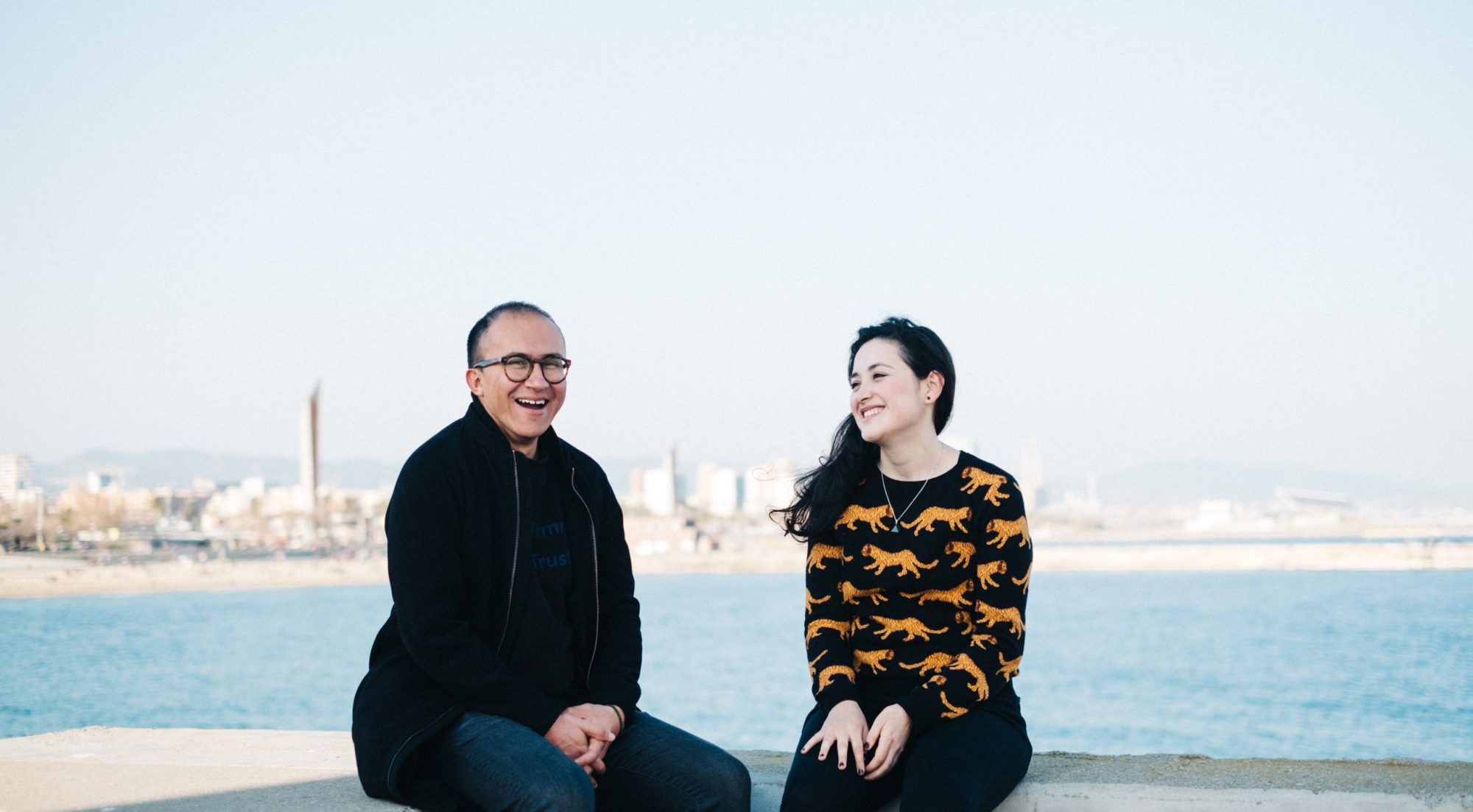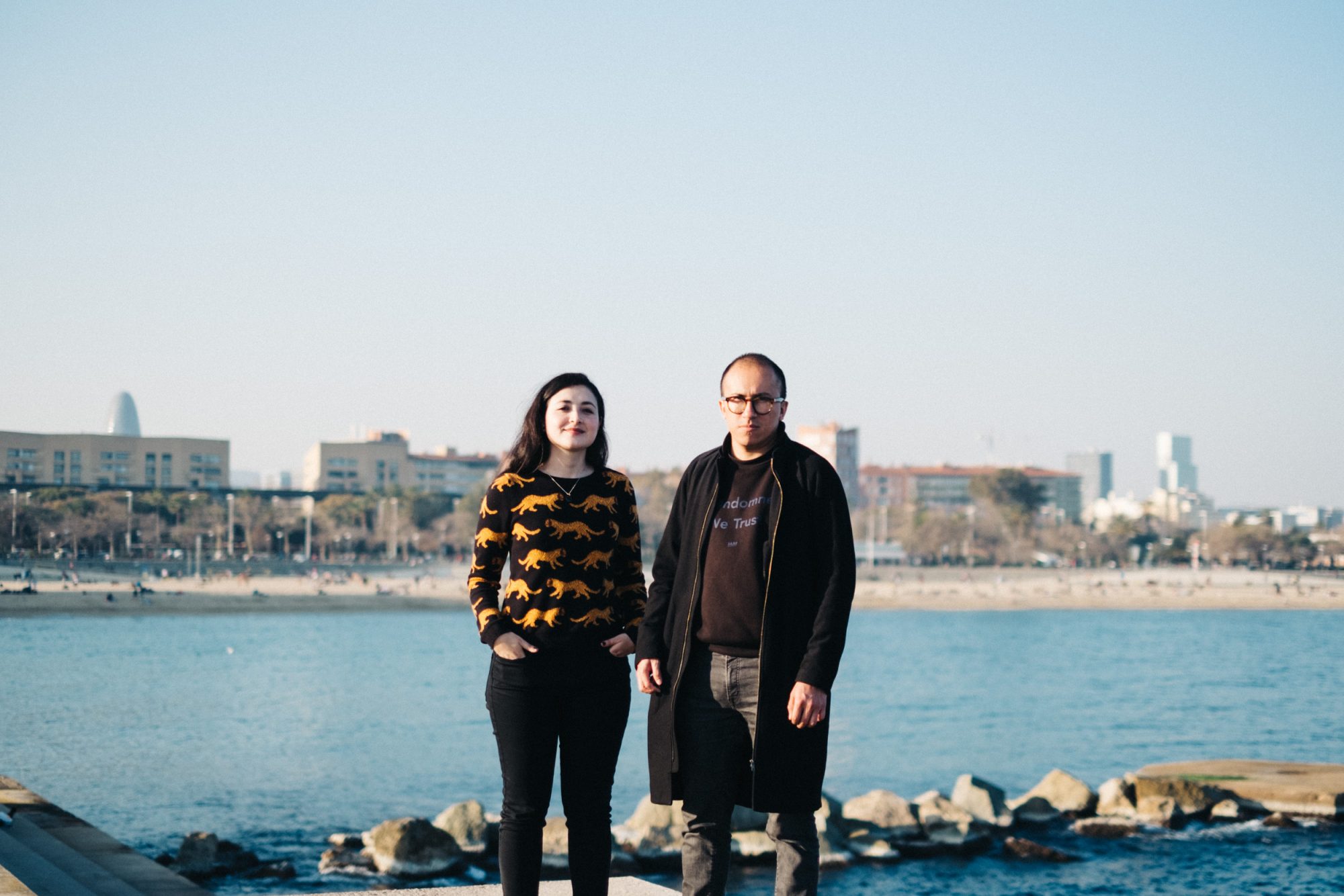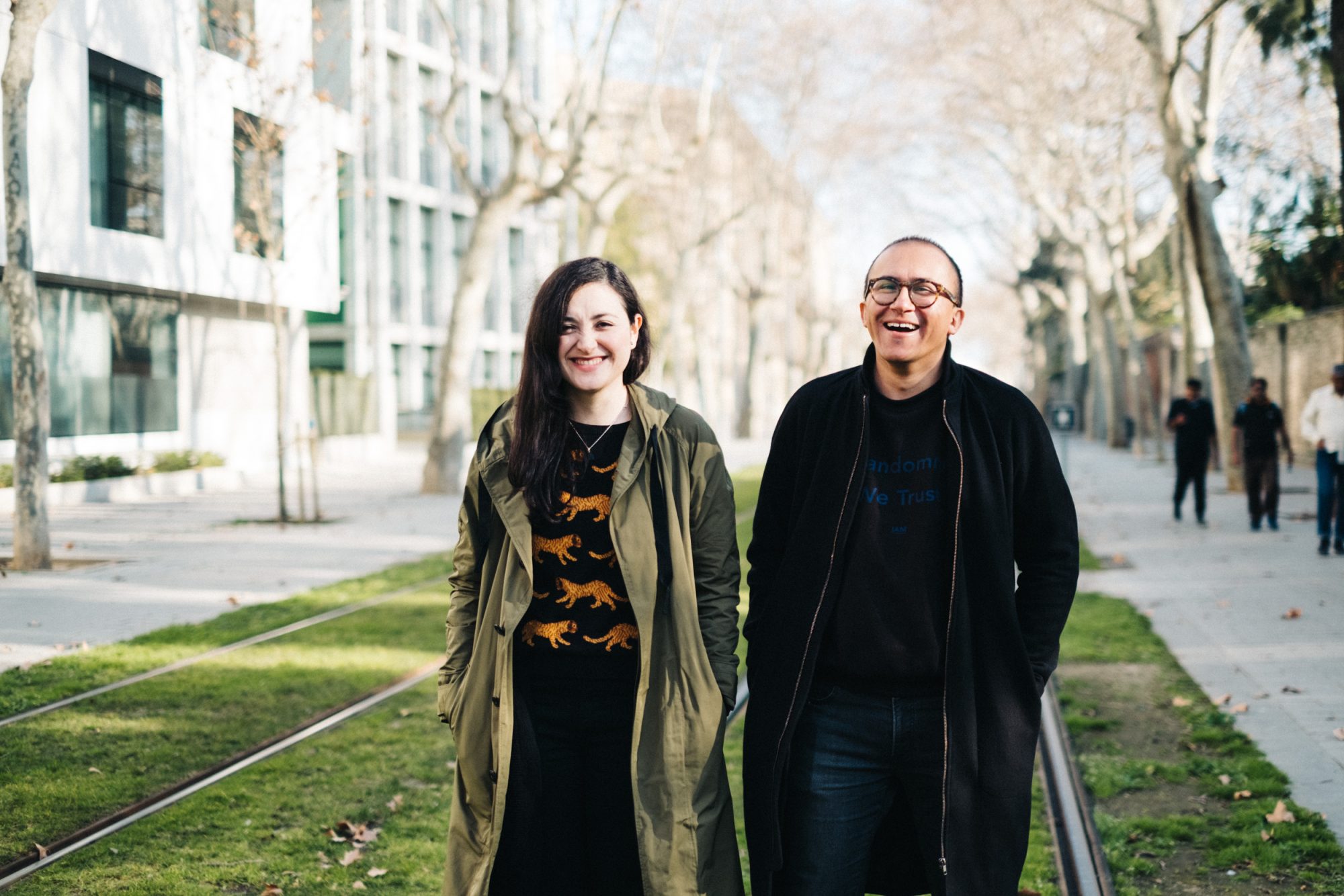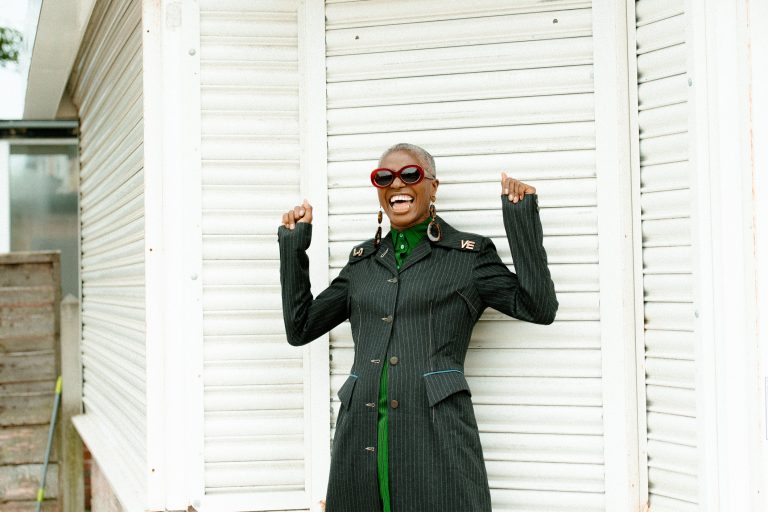
Everything is Connected
For Lucy Black-Swan and Andrés Colmenares of IAM, thinking about futures isn’t about finding answers, it’s about asking better questions. Ahead of their annual conference in Barcelona, Anna Dorothea Ker discovers what they’re turning their minds to next
Words by Anna Dorothea Ker
Photography by Jan Phoenix
“In the Internet age you are a medium,” states the manifesto of Lucy Black-Swan and Andrés Colmenares. “Together we are media.” It is our future as collective media — or rather, futures in the plural — that the partners in work and life have spent over a decade questioning, imagining, and creating. In 2014, they founded IAM, an alternative think tank and strategic consultancy dedicated to critically optimistic, collaborative thinking about digital futures. Central to their philosophy is a reconsideration of what we consider to be the internet. Lucy and Andrés’ definition is “networks of networks of people”. Rather than technology itself, it’s the way in which people engage with technology that interests them. “Humanity is what happens in between humans,” Andrés says. “We are the internet.”
As Generation Y-ers who came of age along with the world wide web in the late ‘90s and early ‘00s, the pair “knew life before high connectivity, and appreciate the possibilities of being connected in real time,” though they admit that screens were a formative element of their partnership. Skype calls across the Atlantic sustained their long-distance relationship for three years after Lucy left their mutual home of Bogotá to build on her Bachelor’s degree in psychology with an MA in Paris, specialising in marketing for luxury brands. Meanwhile, Andrés — who had studied advertising — taught himself web design and freelanced for clients with a particular focus in youth marketing. Both were engaged in trend research, and their professional and personal interests converged in a way that Lucy describes as “a very natural flow, with several conversations about what we wanted to do – our ideas, passions and dreams.” Their complementary skills and strengths, which would result in the foundation of IAM, balance Andrés’ training in creative communications with Lucy’s knowledge of what makes us tick as humans. “Lucy is more analytical, and has more knowledge on human behaviour, while my thinking is more creative,” he muses. “When we met we saw an interesting combination of perspectives and ways of seeing the world.”


Fast forward to 2014. Reunited, the pair are living in Barcelona, a city which Lucy loves for the room it gives for “reflection, random exchanges and serendipity.” Those same values form the founding pillars of IAM, guided by a clear and specific goal, which was “to create a different type of media company that could influence the agendas of creative tech companies, cultural exhibitions, and universities,” explains Andrés. “By working with this scale of organisations, we could reach young people.” The pair expressed that vision in a three-minute video and outlined a five-year timeline envisaging what they wanted to achieve – festivals, films, and a consultancy business, for starters. IAM’s first event, which took place in 2015, was “designed for randomness,” as Andrés puts it. “The opportunities started to arise, and shaped everything.”
Borrowing from Steve Jobs’ idea of “connecting the dots backwards,” the duo reminisces on one such opportunity that sparked by an intern. In the lead-up to the inaugural IAM Weekend, the pair received an email from a young woman who was interning at the global creative communications company, Moving Brands. Explaining that IAM’s mission resonated, she said she would love to attend the event, and was sharing it internally in the company. As no previous references were available she couldn’t get her costs covered, so she requested to volunteer. They replied yes, and a long-term domino effect was triggered. One year later, another email from Moving Brands arrived in Lucy and Andrés’ inbox, this time from the head of global marketing, who was looking for under-the-radar conferences for their CEO to attend. Moving Brands swiftly signed on as partners for IAM’s second edition, during which the company was invited to share a live case study with a client of their choice, which happened to be the BBC’s head of design. The next year, 2017, seven employees from the BBC attended the IAM Weekend, and in 2018, a creative collaboration between the two organisations launched to investigate “How to Fix the Internet.”


The successes generated by Lucy and Andrés’ unwavering belief in the possibilities generated by randomness are bold and invigorating, yet naturally, they come with their challenges. The main hurdle, explains Lucy, has been securing stable revenue sources to achieve financial independence. This is due in part to the nature of IAM’s existence. “Being an alternative, young and independent think-tank makes us question the existing funding models for the kind of outputs that our research and advocacy has,” she shares. “We address a network of topics that don’t fit one particular category, and we always take critical or political perspectives that traditional sponsorship models don’t fit.” One former sponsor withdrew their funding for the event on the grounds that it was “too educational”, a critique Lucy admits she’s still grappling with. Finding sustainable solutions is an ongoing process, yet after five years the annual IAM Weekend remains free of advertising, largely funded by ticket sales. In their current model, a higher fee for company attendance subsidises cheaper tickets to students and underemployed professionals.
This year, the IAM Weekend — now in its fourth iteration — will take place on 21-23 March 2019 at the Polytechnic University of Barcelona. Around 400 creative minds across a broad range of industries — from activists and academics to creative technologists, dancers and filmmakers — will come together to exchange ideas on the theme “The Quantumness of Archipelagos,” which is also IAM’s general focus area for 2019. Though it has an abstract ring, the topic can be broken down simply, Andrés explains. The “quantum” element is intended to evoke the idea of a multi-dimensional canvas, which allows for the juxtaposition of broad topics like migration, climate justice, and the futures of citizenship. Each of these fit into IAM’s concept of “planetary thinking,” heavily inspired by the work of the late astrophysicist Carl Sagan. The “archipelago” element can be understood on a philosophical or geographical level, with the analogy of an island chain intended to illuminate our relationship to the planet. We are individuals, but all part of, and interdependent on, a larger whole. “By connecting these elements together, we aim to create a space to speak about all of these topics, within the framework of the future of the internet, which connects everything,” says Andrés.



The starting point for these conversations for Lucy and Andrés is a simple shift in the way we talk about the internet, and the future – but one with profound effects. IAM speaks of both in the plural, so as to challenge the dominant Western narrative of the internet as a fixed, singular place that society is hurtling towards on a linear trajectory. “The idea of adding the “s” comes from the idea that there are multiple narratives surrounding the internet, rather than just the Silicon Valley one,” explains Andrés. One of this year’s IAM Weekend speakers, Alejandro Mayoral Baños, embodies this approach in this work. Hailing from Mexico, the Indigenous activist and Ph.D.Candidate works together with Nations, Métis and Inuit peoples in Canada on technology-driven projects that respect the Indigenous communities’ different values. Some of those include “the climate and environment, energy consumption, and the idea of only thinking of humans as users or consumers.”
The strikingly simple addition of an “s” to “internet” is a powerful antidote against the tokenism to which narratives on diversity risk defaulting. Surface-level representation and the fulfilment of quotas allow companies to avoid addressing the entrenched structures that continue to perpetuate power imbalances and inequalities that affect BAME and LGTIBQ+ people and women on a daily basis. According to Lucy and Andrés, these are symptoms of a deeper issue, namely the toxicity of the patriarchy, a manifestation of capitalism. “When you start thinking of the internets as many possible internets, that’s a decolonising way to decolonise knowledge, which is decolonising technology, which is decolonising the future.” Futures, rather, according to IAM’s three WTF! (“What the Future!”) principles: futures as plural, futures as tools, and futures as able to be invented. “We invite people to go beyond the idea of the paradigm of the future as something to be predicted – rather, to be collectively imagined.” After all, IAM does not exist “get answers, or conclusions. It is to create a space where better questions can be cultivated, and connected.”


Which kinds of questions, then, need more attention? Rethinking the future of creative education is never far from Lucy and Andrés’ minds, taking into consideration that the ways in which young people today are thinking will have a huge influence in 30 years’ time. “The easy answer, the most accepted, would be learn to code, AI, the next big thing in tech. That would be, in the short-term, a good solution in terms of salary, but what use is a good salary on a planet, and in a society in such a state of crisis?” Andrés challenges. Instead, they believe the most important aspect of contemporary learning should be philosophy. Learning how to learn, to use the brain. And not just by reading philosophy books, but rather by questioning how we should learn philosophy in the internet age: “we want to encourage young people from all kinds of backgrounds to become philosophers and re-think philosophy so that new schools of thought can emerge.” Alongside this comes the need for a renewed sense of individual confidence in alternative thinking. Thinking back to the advice she would give her 20-year-old self, Lucy says, “believe in yourself, no matter what other people say, do or think. If you don’t believe in yourself nobody else will do. Trust your intuition, and remember that you can achieve anything you imagine if you work with enough perseverance.” If the trajectories of these two are anything to go by, her words should be taken seriously.

This feature is part of our ‘Creators’ series of stories, where we meet the individuals who are shaping the future of the industries in dynamic and empowering ways. We recently announced our forthcoming partnership with IAM and together we’re launching an exploration of the futures of internships. This piece is not paid, we wanted to use the opportunity to introduce Lucy and Andres to you, so that you can see why we’re so excited to collaborate with them. Everything Is Connected is written by Berlin-based, globetrotting writer, editor and translator Anna Dorothea Ker, follow her beautifully curated Insta here. The photography is by the wonderful Jan Phoenix, a photographer and filmmaker based in Barcelona, whose Insta is awash with gorgeous natural light. Our collaboration with IAM commences at the IAM Weekend 19 in Barcelona on March 21st-23rd. Student tickets are just €99, pick one up here and help us to define our investigation.








